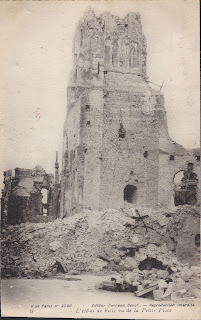It was with considerable relief that B Company snipers were paraded separately for their specialist training. The art of sniping and observing involved a considerable amount of time spent in the prone position and that was always acceptable. On this occasion Lieutenant Chilton led his charges into the sunlit fields well away from the unfortunate squads on the bayonet course who were jumping trenches and prodding synthetic Huns in the solar plexus. Moreover we were completely out of sight of those in higher authority. Lolling comfortably in the hay we listened to Chilton discoursing amiably on “Taking Cover” and “Observation” as well as many other subjects not to be found in the military textbooks. A little practical work followed the “lectures” but on the whole it was a pleasant morning’s work.
Back with the Battalion the afternoon was given up to “football parade” but I have no recollection of participating.
A regimental concert booked for the evening held the promise of a happy ending to a perfect day but, in the event, the stage was set for a finale which left us in a state of gloom and despondency. The performers did their best but their style was cramped by the presence of the Colonel himself (1) seated on the hastily erected stage and beside him, his guest, the Colonel of the Queen Victoria Rifles. It was patently obvious to performers and audience alike that the Queen’s Westminster Rifles were on show and woe betide any man who sullied the fair name of the Regiment. To the youngsters of the 8th Platoon “Spindleshanks” (2) was not held in great affection. To us he was a remote figure lacking the common touch and, because of his addiction to ‘spit and polish’ both on and off the parade ground, someone to be avoided whenever possible. I myself spent one miserable day in the back area solely because the small piece of red flannel, which should have been in place behind the black cap badge, had disappeared. That was a crime! The Colonel was well in evidence that day so after making numerous details around the village to avoid his eagle eye I retired to my billet and sulked in solitude.
The concert proceeded with unaccustomed decorum but the troops soon wearied of the everlasting “Eleanor” and “My Old Shake”. Suddenly the Sunday School atmosphere changed like magic when Rifleman X, quite oblivious to the presence seated immediately behind him, launched out with a ‘humorous’ song with a decided element of the bawdy. The audience applauded but the Colonel did not appreciate the subtleties of the rendering. There were no doubt many verses to this masterpiece of obscenity but we were not permitted to hear the complete version. In the middle of one verse “Spindleshanks”, with tight lips, raised his hand and stopped the show. Moving forward he addressed the assembled Company somewhat as follows.
“Now men, you have had your bit of fun but we must now turn our thoughts to the sterner times which lie ahead. In a day or so the Battalion will be moving off to another sector. We shall trek northward and when I tell you that the fighting there will be grim and bloody you can perhaps guess our destination. We are in for a tough time. I suggest you now return to your billets and get all the sleep you can. Goodnight.”
We knew without being told that “sterner times” must necessarily be our lot in the not far distant future and it was now clear that the promised trek northward could only mean the dreaded Ypres Salient. So far our reaction to warfare had been to ‘live for the day and to Hell with the future’. Indeed, no different attitude of mind was conceivable if we were to retain our sanity. A few words of encouragement from the Colonel was the least we expected. In effect all that he said was “you’re for it”. The apostle of doom departed with his guest – his men were silent.
Such were the immediate feelings of the men on the 20th July. But on reflection came the realisation that youth, so far untried and untested, had failed to recognise the sorrow and bitterness of an elderly Colonel who had borne the immense tragedy and disillusionment of seeing his beloved Regiment decimated on more than one occasion. The Colonel was a sick man both in body and spirit.
Sniping parade.
Lt Chilton - observing and taking cover, etc.
Afternoon football parade.
QWR concert in evening in field.
 |
| Original diary entry |
 |
| Original journal notes |
(2) "spindleshanks" is a person with long, slender legs













































